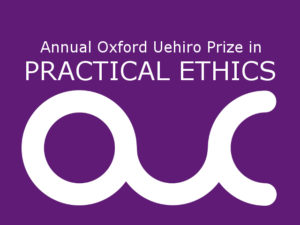Announcing the Winners and Runners Up in the 9th Annual National Oxford Uehiro Prize in Practical Ethics
 Please join us in congratulating all four of the finalists in the National Oxford Uehiro Prize in Practical Ethics 2023, and in particular our winners, Lukas Joosten and Avital Fried. We would also like to thank our judges, Prof Roger Crisp, Prof Edward Harcourt and Dr Sarah Raskoff.
Please join us in congratulating all four of the finalists in the National Oxford Uehiro Prize in Practical Ethics 2023, and in particular our winners, Lukas Joosten and Avital Fried. We would also like to thank our judges, Prof Roger Crisp, Prof Edward Harcourt and Dr Sarah Raskoff.
This, the final of the 9th Annual National Oxford Uehiro Prize in Practical Ethics, was held on the 14th March in the lecture theatre of the Faculty of Philosophy, as well as online. During the final the four finalists presented their papers and ideas to an audience and responded to a short Q&A as the deciding round in the competition. A selection of the winning essays and honourable mentions will be published on this blog.Read More »Announcing the Winners and Runners Up in the 9th Annual National Oxford Uehiro Prize in Practical Ethics

